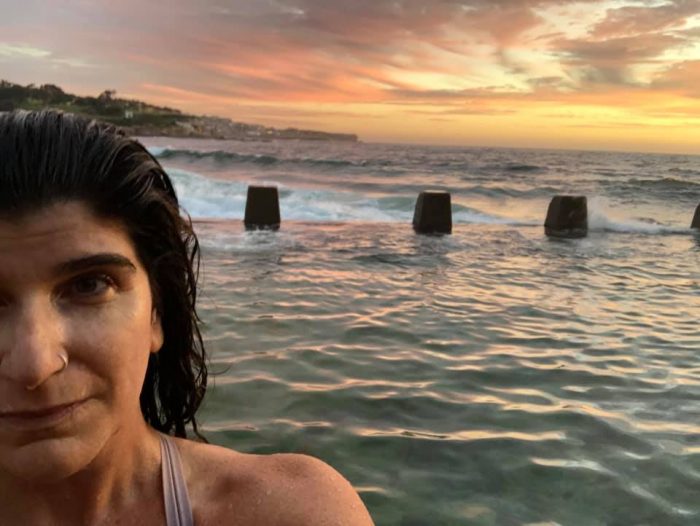Six months ago, I couldn’t stand.
It happened suddenly. After a 14-hour flight to visit my critically ill father, the final stress on top of several years of working too hard (I hadn’t taken a weekend in two years and imagined this was something to be proud of).
It was a severe L3-4 prolapse; the diagnosis doesn’t convey the agony, the helplessness, the ordeal of going to the loo.
It was a felling of the most literal and symbolic kind.
In some of my darkest moments, I kept reminding myself that I was in the middle of the story; that I needed to trust the arc that would play itself out—in time and with a perspective I didn’t yet have. Some days, I felt as if all my spiritual training had abandoned me. I just wanted to be strong again.
In time, my dad recovered from the brink. I somehow got back to Australia (after eight weeks on my back). My doctor and physiotherapist instructed me to keep moving in any way I could.
So, every day I gingerly made my way down to the ocean which is two hundred metres from my doorstep in my seaside suburb in Sydney. And there I began to move the bruised animal of a body that had all but forgotten any sensation but pain.
At first, I sank into the water just to get relief from gravity, to feel lightness in my bones. Then I began to move. To sway. Then, finally, to swim.
With each passing day, I slowly came back into my body. I got stronger. Fitter. My lungs awoke. My spine softened. And I fell madly, ridiculously in love with the ocean.
All my life, I have swum in it, as most folk do in summer, for a few minutes at a time. I have thought of it as a place to cool down in, a lucky-me-I-live-by-the-sea view to admire from the shore.
But now, in the past few months, I’ve become an open water swimmer. No more quickies—a splash close to shore, a dive through a few waves, never to lose the sand beneath your feet. But full-on, deep-blue water beneath you, one to two hour, and one to two kilometre swims across the bay and back, around Wedding Cake Island (800 metres from shore) and along the cliffs that hug Coogee Bay. I have swum past gropers and stingray, fish of all colours and sizes, been allowed to hover in schools of silver, blue, and yellow fish that flicker like shafts of light in the water.
Each day I make my way into those first few chilly moments (it is mid-winter here in Sydney) and shriek as the water gets to that turning point spot, behind the neck, and then I kick and get my face wet before I manage those first few muscled freestyle stokes. It’s a daily seduction and now, compulsion. I will swim in rain or wind. I will swim no matter the out-of-the-water temperature or the in-the-water temperature. I used to “hate” cold water. Now I crave it.
Not only has the ocean helped me fully recover from my prolapsed disc and avoid surgery, but Martin Prechtel in his beautiful book, The Smell of Rain on Dust, explains that the ocean is the place that can hold our grief. I suppose it is just what I have needed these past few months as I’ve come to terms with so much loss—not only of a beloved friend some months ago, but with ecological grief and all the extinctions we’re experiencing.
“Aren’t you scared?” People ask me.
(I love being on the other side of that question, having spent my life asking that of skydivers, trekkers to remote places, and others who risk their safety for the adventures of life.)
“Of what?” I ask.
“Sharks. Getting a cramp. Drowning. Big waves. Jellyfish. Bluebottles.”
Oh yes. I am terrified of all those. I have seen sharks (toothless wobbegongs so far), been stung by jellyfish and bluebottles (and it hurts like hell, for a few hours, nothing more), and I am learning how to dive through big waves—you have to bow, not rise, to meet the ocean. As for badass human-ivore sharks—I hope if I ever meet one, it’s just eaten its lunch. But the likelihood of being eaten by a shark is far less than being in a car accident. So, how do I want to live my life?
Swimming in the ocean has made me braver, and I like that version of me better. I’m still mightily cautious: I check in with the lifeguards before I head out, I read any signs on the beach, I swim (mostly) 20-30 metres away from shore or a rocky ledge, and if I feel the ocean change her mood—a sway and a pull that is bigger than I am—I exit immediately. I know my place.
I recently had a body memory of being a kid in the ocean. My mum always told me that on family holidays to the beach, she couldn’t get me out the water. I’d be in for hours, and return blue-lipped and finger-wrinkled when hunger drove me out.
So, what happened? When did I stop?
I think it coincided with puberty. When I became conscious (as in self-conscious) about being in a swimsuit. I must have looked at myself in the mirror and thought “nah, you can’t go out in public like that.” I don’t remember that, but I must have. Why else would I have stopped? Being in the ocean, in the way I do it, is childlike and uncool. I speak to the fish. I flip around like a dolphin, it is unathletic and playful.
The joy of now is that I don’t care about how I look in a bathing suit. I care how I feel when I’m in the water.
Being in the water always makes me feel better about being in my body and skin. It has also dislodged the false separation between me and the rest of the natural world. When I swim, I often cry—from joy and wonder and unbearable sorrow at what we’ve done to the planet.
I want to share this love with everyone, because I suspect it’s a crucial key to our wellness—not only physical but psycho-spiritual. Returning to the ocean regularly, letting the water tickle us in ticklish places, is a way to re-wild ourselves and reconnect us with humility and gratitude.
I’d love to encourage you to return when you can. Give the ocean your grief. Feel her hold you in her tender salty embrace. Tell her you love her (she needs to hear it).
And if you are nowhere near the sea, find a lake. A swimming pool. Maybe just run a long hot bath. Remember what it was like when water held you and you were so full of hope for the world that awaited you?
~


 Share on bsky
Share on bsky





Read 4 comments and reply